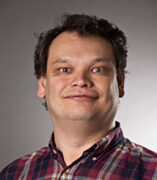
Vadim Gaponenko, PhD
Professor
Department of Biochemistry and Molecular Genetics
Lab
Office Phone:
Email:
Related Sites:
General Interests of the Gaponenko Laboratory Heading link
We are interested in understanding how protein molecules acquire and perform their function. Functional characteristics of protein molecules are encoded in their structure and are revealed in their interactions with other molecules. A multidisciplinary effort to characterize these interactions in living cells and the ways of their modulation through conformational flexibility will allow efficient therapeutic intervention and engineering of novel molecular machines. Our long-term objective is to develop an integrated approach to study macromolecular interactions. This approach will provide answers to such fundamental questions as why biomolecules interact in a specific but versatile manner and how their functions are established in living organisms. With this information in hand engineering of molecular machines with designed functions will become possible. The role of NMR in this process is indispensable. NMR allows investigation of weak interactions, which are the very essence of biology, and it is the methodology of choice for studying molecular dynamics.
Currently, our research focuses on:
- unraveling mechanisms responsible for spontaneous assembly of peptide molecules into nanostructures;
- structural characterization of inhibition of oncogenic protein Kirsten Ras (K-Ras) by Calmodulin;
- understanding the structural basis for interactions between the Signal Transducer and Activator of Transcription 3 (STAT3) and the chromatin remodeling factor Histone Deacetylase I (HDAC-I); and
- elucidation of the mechanism of cancer specific apoptosis exerted by the viral protein Apoptin.
In order to study these important biological systems we develop and use novel NMR techniques in conjunction with biochemical, biophysical, and computational approaches. Understanding how K-Ras, STAT3, and Apoptin engage in macromolecular interactions will have an immediate significant impact on cancer therapy.
Education
PhD, University of Cincinnati, Cincinnati Ohio
Postdoctoral: National Cancer Institute, Frederick, Maryland